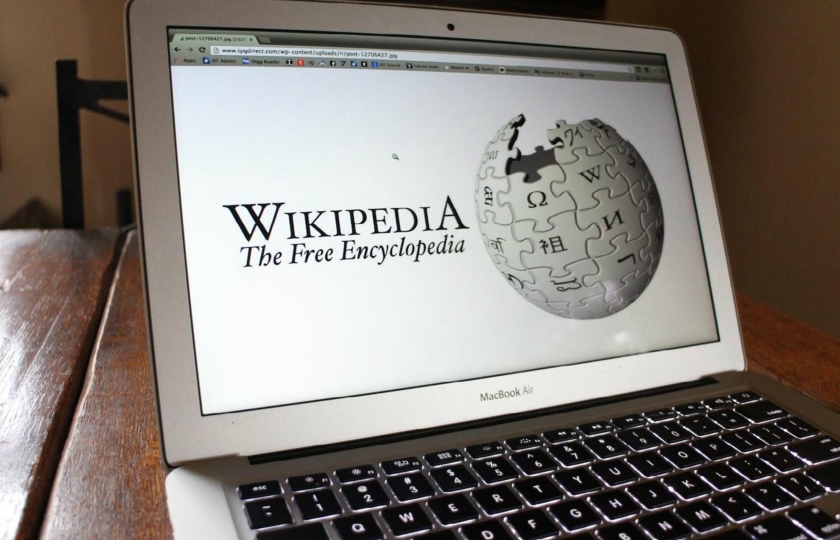In summary, for over three decades, Dr. Radin has become a leading scientist and commentator on parapsychological research. Besides his work being recognized by numerous famous and accomplished scientists and professors worldwide, who hold credentials far above what is necessary for referencing on Wikipedia, he actually shares something in common with Skeptics. He writes on his web page, “Regarding religion, I am agnostic and religious beliefs have played no part in my life. I have maintained a daily meditation practice for many years for the same reason that I exercise — the health benefits are obvious.” But his treason has been to accommodate a scientific perspective towards subjects that are held anathema by the fundamentals of Skepticism. For this breach against Skeptics 19th century view of reality, he has been forced into a limbo of condemnation on Wikipedia.
Wikipedia’s culture of character assassination: The case of Dr. Dean Radin
04/18/2019 / By News Editors

Many therapeutic modalities in natural and non-conventional medicine share principles in common with parapsychology. This is particularly true of Mind-Body medicine, the power of the mind to initiate and facilitate healing. Some medical practices are based upon theories of energy, such as acupuncture, energy medicine and therapeutic touch, and the healing abilities of martial arts such as Tai Chi Chuan and Qi-gong, and energy and theories of consciousness play a large role in parapsychological or psi research. Therefore, in addition to investigating persons in non-conventional medical professions who have been victimized by Skeptics on Wikipedia, we will also consider many prominent scientists who have suffered from character assassination by Skeptics who consistently ignore Wikipedia’s editorial rules for living persons.
(Article by Richard Gale and Gary Null republished from PRN.fm)
Dr. Dean Radin is currently the Chief Scientist at the Institute of Noetic Sciences (IONS) and a distinguished Associated Professor at the California Institute of Integral Studies. Although much of his current scientific research has explored paranormal phenomenon and theories of non-local consciousness, he has never identified himself as a psychic. His states his role has been strictly that of a scientist investigating and researching such phenomenon. With degrees in electrical engineering, focusing on cybernetics and control systems, Radin later received a doctorate in psychology from the University of Illinois. He has held appointments at AT&T Bell Laboratories, Princeton University, the University of Edinburgh and the Stanford Research Institute (SRI). He was also on the faculty at the University of Nevada for a stint. Back in 1979, Dr. Radin was one of the first to develop the first computer-based artificial intelligence training system.
For Skeptics and reductionist scientists in general who embrace a strict mechanistic view of reality, Dr. Radin’s sin was to explore parapsychological phenomenon, although national surveys conducted by IONS indicate that over 90% of scientists and engineers state they have personally experienced psi experiences. His Wikipedia page makes no acknowledgement that he was already a highly respected scientist when accepted to work with the secret Stargate Project coordinated by the US Army, the Defense Intelligence Agency and SRI International at Fort Meade. The Project was dedicated to researching the potential use of psychic skills, including clairvoyance and remote viewing, for domestic intelligence and military operations. Although the Project was purported to have been officially terminated in 1995, it had been active for 17 years. It was only after the Project was transferred to the CIA that the government publicly stated the Project’s research was inconclusive and therefore it did not warrant further investigation.
Certainly, Skeptics would accept the Project’s conclusions at face value. It fits well with their campaign to discredit the existence of paranormal and psychic experiences and capabilities. But controversies have remained over the Project’s successes and failures. Many who were involved in the Project, such as Dr. Radin, have continued research in parapsychology and the field of consciousness studies. Others have gone public to speak about the Project’s achievements.
In 2001, Dr. Radin moved on to become a senior scientist at the Institute of Noetic Sciences, a parapsychological research organization, co-founded in 1973 by Apollo 14 astronaut and the sixth person to walk on the moon Edgar Mitchell. It was during the Apollo lunar mission that Cpt. Mitchell claimed to have had mystical experiences that he later found described in ancient Hindu yoga texts. It was due to his personal mystical experiences in outer space that inspired Mitchell to dedicate his future work towards a scientific investigation into parapsychology. Upon retirement from NASA, Mitchell founded a company to promote ecologically-pure products and services. Very early, Mitchell had realized our planet and society would face severe ecological problems in the future.
Dr. Radin’s Wikipedia page, launched in August 2004, has been edited numerous times during the past 14 years. It is an excellent example of Skeptics’ editorial strategies. The original biography was short and innocuous. Five short paragraphs containing a straightforward biographical profile of 11 sentences has now morphed into a lengthy essay devoted to referencing Radin’s critics in a manner that promulgates the Skeptic doctrine that paranormal experiences do not exist and most claims are hoaxes by charlatans. In his page’s editorial history, one typical Skeptical editor under the pseudonym Susha23 attempted to include the sentence, ”’Dean Radin (born February 29, 1952) is a pseudoscientist who defrauds millions of people a day with his books The Conscious Universe.” Fortunately Susha23 was banned from editor privileges.
During a conversation with Dr. Radin, he stated that numerous attempts, by him and others, to correct his biographical page have been made over the years. He noted that corrections can be immediately reverted back within 30 minutes. Even the Nobel Prize laureate in physics, Dr. Brian Josephson, made unsuccessful efforts to edit Radin’s page in August 2014. Keeping true to a legitimate scientific perspective, Radin acknowledges the controversies and debates regarding parapsychological research and the conflicting neuroscientific theories about the nature and function of consciousness. As with many scientists, medical doctors, and alternative health practitioners with whom we have spoken regarding misinformation, distortions and character assassinations by Skeptic editors on their Wikipedia pages, Dr. Radin simply wants balance. As he writes, “there should always be room for scholarly debates.” But there is no sense of balance whatsoever on his biography because Wikipedia Skeptics are largely not scholars, and certainly not experts nor professionals in the subjects they criticize.
Dr. Radin is outspoken against the Skeptical creed and its tactics on Wikipedia. He has written about the Skeptic fallacy in his books. Perhaps this is one reason why he has been so harshly targeted by Skeptics on Wikipedia. He states that his Wikipedia article is “slanted by only citing the opinions of extreme skeptics, most of whom are ignorant of the relevant literature, methods, and history of psi research. For example, these skeptics often claim that the results of experimental psi research are so rife with fraud that none of it can be believed. That claim confuses con artists who pretend to be psychic with the scientific study of psi. The fact is that there are less than a handful of demonstrated or suspected cases of experimenter fraud in the entire history of psi research.”
People visiting a Wikipedia page get their first snap shot of a person’s biography or a subject from the first lead paragraphs. These are the principal statements that frame the remainder of an entry. For biographies of living persons, it is the lead section that can boost or destroy a person’s career and reputation. Radin’s lead section doesn’t identify him as a doctor. And the fourth sentence immediately starts a rampage of criticisms and accusations that continue throughout the page.
Dean Radin’s books have been praised by two Nobel Prize winners (Dr. Kerry Mullis who invented PCR technology and Dr. Brian Josephson, who received the Nobel in Physics at the age of 22 while at Cambridge University). Other noteworthy voices praising his work are molecular biologist and neuroscientist David Presti at the University of California at Berkeley, cognitive neuroscientists Mario Beauregard at the University of Arizona and Michael Block at the University of San Francisco, Dr. Paul Werbos (program director at the National Science Foundation), Stanford professor emeritus of physics Peter Sturrock, and the renowned public advocate attorney Daniel Sheehan, best known for his roles in the Pentagon Papers, Silkwood Murder, Iran-Contra, Ten Mile Island and Standing Rock trials.
Nevertheless, his Wikipedia biography “fails to mention any of the scientists who have endorsed my work, including two Nobel Laureates, a program director from the National Science Foundation, a past president of the American Statistical Association, recipients of major awards from the National Institutes of Health and the National Academy of Sciences, and many other scientists and scholars.”
Radin’s book The Conscious Universe was Amazon’s number 1 parapsychology book, received the 1997 Book Award from the Scientific and Medical Network and the Best Book Award from The Animist. It has also been translated into eight languages. None of this is noted on Radin’s Wikipedia page. Rather the book’s description is confined to the comments and reviews of noted Skeptics, including the radical Skeptic Robert Todd Carroll, author of the Skeptics Dictionary and a fellow on the Committee for Skeptical Inquiry, and a review of the book published in Nature. The Nature review later was found to contain blatant errors. Skeptics have based their criticisms on these errors which Nature eventually corrected. But his Wikipedia page does not indicate these corrections.
Critiques of another of Radin’s books, Supernormal, published by Deepak Chopra, relies upon a review from the Skeptical Inquirer to discredit its premises. The Wikipedia review of the book makes no clear mention of what the book is actually about or states in any clear words Radin’s premises described in the book. The Skeptical Inquirer is a popular bi-monthly magazine popular among Skeptics and targeted to a general audience. It is not peer-reviewed nor is it recognized as a major publication of any valuable means for objective analysis and commentary. It is propaganda publication on par with religious evangelical magazines. It is intended to advance a “religious” belief under the banner of Skeptical scientism. Referencing the Skeptical Inquirer as a legitimate resource for information about living persons is in direct violation of Wikipedia’s editorial policies.
Read more at: PRN.fm
Tagged Under: alternative medicine, anti-science, biography, character assassination, defamation, direct violation, disinfo, Dr. Dean Radin, editorial rules, natural medicine, scientific, skeptics, slander, smeared, tech giants, Wikipedia














